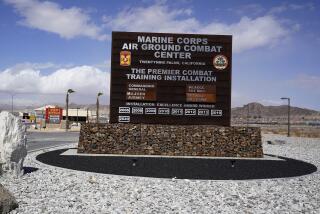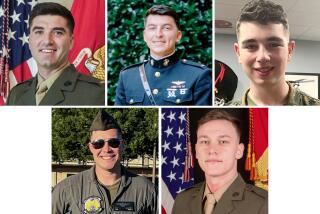9 Marines Killed in Iraq Car Bombing
- Share via
BAGHDAD — Nine Marines were killed and nine others were wounded in a car-bomb ambush near the insurgent stronghold of Fallouja on Saturday in the deadliest incident involving U.S. forces in nearly nine months. Another car bombing killed at least seven Iraqis outside the Baghdad offices of an Arabic news channel.
In a third incident, Iraqi security forces reportedly killed 14 people when they opened fire on vehicles carrying civilians after a roadside bomb attack on a U.S. Army convoy about 25 miles south of Baghdad.
The attack on the Marines underscored the growing use of car bombs as the weapon of choice in attacking military convoys. Vehicles can be packed with far more explosives than artillery shells or land mines, which are commonly used as roadside bombs.
Saturday’s mayhem came as U.S. forces readied themselves for an all-out assault on Fallouja and clashed with militants on the city’s outskirts during scouting missions.
U.S. military officials say the city west of Baghdad has provided refuge to insurgents as well as Jordanian militant Abu Musab Zarqawi. Fallouja must be retaken if national elections are to be held as scheduled in January, they say.
Over the last month in Fallouja, aerial bombings and raids by the Marines and Iraqi soldiers have destroyed numerous homes and structures suspected of serving as hide-outs for members of Zarqawi’s network.
The 1st Marine Expeditionary Force based at Camp Pendleton announced the Marines’ deaths in a press release. The unit has formed a cordon around Fallouja.
Unlike the Army, which describes the circumstances of soldiers’ deaths, the Marines do not provide such information for fear it will endanger them.
But a military source who requested anonymity said the nine were killed when a suicide car bomber rammed a Marine convoy just southwest of Fallouja. Insurgents then fired on the convoy, which was towing a disabled vehicle.
Another source said the attack was near Abu Ghraib, slightly to the east of Fallouja.
The American death toll was the worst in a single incident since Jan. 8, when nine soldiers were killed as a Black Hawk helicopter crashed west of Fallouja.
In the Baghdad attack, 19 people were injured in addition to the seven killed as the car bomb exploded in a parking lot near the offices of Al Arabiya, a satellite television channel based in Dubai, United Arab Emirates, that has drawn the ire of insurgents as well as the Iraqi and U.S. governments.
Not all of the casualties could be promptly identified, Al Arabiya staffers said, but it appeared that seven employees were among the injured, mostly technicians and drivers. The other casualties appeared to be passersby.
The explosion rocked Baghdad’s upscale Mansour district, blasting a hole in the front of the office and spraying shards of glass throughout the building. Outside, the blast left an enormous crater and littered the street with mangled bodies and flaming vehicles.
A thick black column of smoke rose into the sky, and emergency vehicles swarmed the neighborhood and survivors fled the burning building.
“It was awful -- a very strong explosion,” said reporter Faris Mahdawi, who was struck in the head by debris.
“I escaped from the window. Most of my friends were injured. We were about to suffocate because of the smoke and the fire.”
In an Internet posting hours after the attack, a group calling itself the 1920 Brigades took responsibility for the blast, calling the TV station “the mouthpiece of the American occupation in Iraq.”
Al Arabiya has faced criticism from groups across the political spectrum. Even as some Muslims have accused Al Arabiya of sympathizing with the United States and Israel, U.S. officials have called the station’s Middle East coverage inflammatory.
In March, two journalists for the station were killed at a U.S. military checkpoint. Troops shot cameraman Ali Abdel Aziz and correspondent Ali Khatib when they hurriedly drove away from the checkpoint, fearing that a vehicle speeding toward them was a car bomb.
Fear of vehicular bombs may also have been a factor in a deadly incident south of Baghdad on Saturday in which Iraqi national guardsmen and police officers reportedly opened fire on civilians in buses and minivans.
Witnesses and hospital officials told Associated Press that 14 people were killed and 10 injured during the incident in an area that is notorious for attacks on military convoys and Western motorists.
The shootings occurred after several roadside bombs targeted a U.S. Army convoy in the town of Haswa, Associated Press reported.
After the convoy departed, Iraqi security personnel began firing wildly at the civilian vehicles, witnesses said.
Neither Iraqi government officials nor American military spokesmen could confirm the incident.
The Marines’ deaths Saturday underscore that moving in convoys is always dangerous and sometimes deadly. In fact, every time military vehicles move in Iraq, it’s considered a combat mission.
To decrease the number of military vehicles on Iraqi roads -- which they share with Iraqi civilian traffic -- Marines have begun doing resupply missions by helicopter. In some cases, they have dropped supplies by parachute to troops in far-flung locations.
It was unknown whether the convoy attacked Saturday was on a resupply mission.
Brig. Gen. Richard Kramlich, commanding officer of the 1st Force Service Support Group, says his unit moves troops, ammunition and supplies “24/7.”
Marines have taken “an aggressive approach to applying bolt-on armor” on convoy vehicles to protect against roadside explosions, he said.
Kramlich said all vehicles that operate the perimeter of his unit’s massive headquarters in the western part of the Sunni Triangle have armor. The region west and north of Baghdad is a hotbed of insurgents.
“As the enemy changed tactics, we changed our response to their tactics,” he said. “It is clear that the enemy is flexible and adaptive, particularly in the Sunni Triangle.”
The use of “suicide cars” has increased the risk for Marines driving on Iraqi roads. Such cars are often rigged to explode when the front bumper hits another vehicle.
With military and Iraqi vehicles driving 50 mph or faster, an attacker can swerve into an oncoming convoy in a matter of seconds.
“Marines face danger every time they leave the perimeter of this camp,” Kramlich said.
Word of the deaths swept through downtown Oceanside on Saturday, casting a pall over the off-duty Marines from Camp Pendleton who congregate in the videogame parlors, T-shirt shops, pizza shops and fast-food restaurants there.
Many of the Marines have served two tours in Iraq. Others are training for deployment into the war zone. Some said they knew some of the dead Marines.
Civilians cannot understand how it affects Marines to learn that nine of their own have been killed, said Pvt. Kyle Johnson, 18, of Exira, Iowa.
“Civilians don’t really know, they don’t,” he said. “Unless they’ve been there and done that, they can’t know. They hear the news and it’s a shocker, but they forget about it quickly.
“We hear about it, and it stays with us the rest of our lives.”
Many of the Marines are at the infantry school, learning combat techniques that may soon be applied in Iraq.
“Yesterday the training was so hard I thought maybe I should have gone to college instead,” said Pvt. Jeremy Alexander, 19, of Austin, Texas. “Then I heard about the Marines killed and I said, ‘No, I want to be here, getting ready to go there and fight.’ ”
*
Morin reported from Baghdad and Perry from Oceanside. Times staff writer Alissa J. Rubin and special correspondents Suhail Affan, Saif Rasheed and Salar Jaff in Baghdad contributed to this report.
More to Read
Sign up for Essential California
The most important California stories and recommendations in your inbox every morning.
You may occasionally receive promotional content from the Los Angeles Times.













